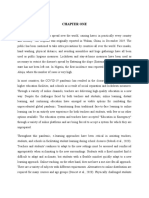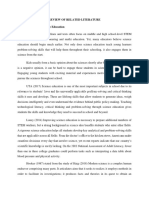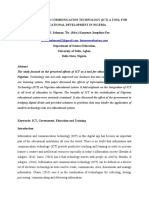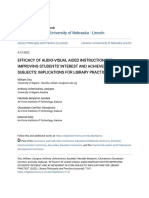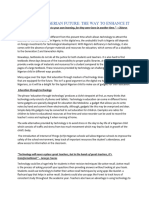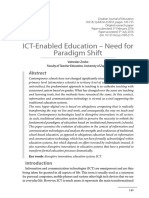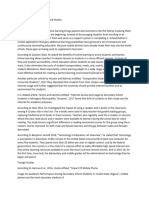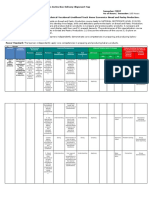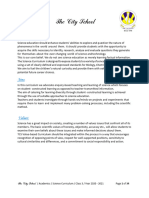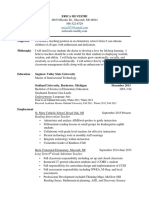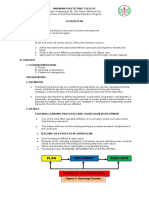CHAPTER ONE
INTRODUCTION
Background to the Study
Education is a tool for achieving moral, intellectual, cultural and social development of the
society. The importance of education to the individual and society cannot be overemphasized.
Due to the significant role of education in promoting technological re-awakening of the society,
individuals and government have been investing financial resources in it (Ekundayo, 2020). In a
developing country like Nigeria, education has been given priority by the Federal, State and
Local Governments as well as members of the public. Education is regarded as an instrument of
change and an avenue whereby a nation achieves greatness socially, politically, technologically
and economically. The National Policy on Education (2014) regarded education as an instrument
per excellence for effecting national development. Secondary education on its own occupies a
unique position in the educational system of Nigeria; it is the level of education that prepares its
graduates for the academic and professional careers. According to the National Policy on
Education (2014), the aims and objectives of secondary education in Nigerian educational
system are to prepare the young citizens for useful living within the society (self-employment)
and for higher education. Every nation invests in education because it can produce unquantifiable
benefits for individuals, organizations and the society as a whole.
Science is a field of human endeavor which seeks to explain accurately the events and
circumstances that exist within our natural environment. It produces law which operates all over
nature and when recognized, reduce events and circumstances in nature to orderly and
predictable occurrence (Remi and Akujobi, 2019). Science is important today and it is frequently
used as a means of understanding the process and development of technology. Science is applied
to a variety of disciplines or intellectual activities, which have certain features in common.
Science is usually characterized by the possibilities of marking precise statements, which are
susceptible to some sort of check or proof (Sivakumar & Kirubanandhini, 2014).
Science is an activity based subject which involves a lot of manipulations, verifications through
which an inference is drawn. The nature of science differing from other subjects makes it unique
and calls for unique and effective mode of teaching it. Nowadays, nations all over the world
1
�including Nigeria are striving to develop technologically and scientifically, since the world is
turning scientific and some activities of lives depend greatly on science.
Computer Science Education is very vital when talking about science and technology
development of any society, as such no nation hopes to develop without embracing Computer
technology. Computer Science is one of the disciplines in physical sciences that studies the
computer hardware and software resources and its power at solving human problem. Computer
science is an interaction between the students and the environment (Willson, 2019). Computer is
a powerful tool for the development of any nation.
Computer science is one of the teaching subjects at all levels of Nigerian education. It is made
compulsory in Junior Secondary Schools. It is a unique subject because of its relevance and wide
application in many areas of study that is, Physics, Biology, Engineering, Law, and many more.
Computer Science has strong connections to other disciplines. Many problems in Science,
Engineering, Health care, business, and other areas can be solved effectively with computers, but
finding solution requires both Computer Science expertise and knowledge of the particular
application domain. Computers can be used to access a vast knowledge base and search for
information achieves over the Internet. Only computer education can facilitate the use of
computers for purposes of communication and entertainment. Computer Science as a subject at
the Secondary School is often regarded as a vocational option (Frank and Quaxil, 2018).
E-learning strategy refers to the practise of enhancing traditional learning with the use of various
electronic instruments. According to Brynjolfsson and McAfee (2013), a programmed
instructional software, website, or web app is one that may simulate human intellectual processes
in terms of lesson delivery, test administration, tracking students' progress, providing feedback,
and displaying experiments in a virtual manner. This learning strategy is not about educational
robots taking employment away from teachers and brainwashing children; rather, it is much
more about conventional application programmes running on tablets, laptops, iPads, or
smartphones that are used to augment classroom instruction (Oteyola, Adeyanju & Egbedokun,
2013). These robots would not be able to take away jobs from teachers and would not be able to
brainwash children. E-learning was selected as a solution to the problems presented by the
conventional system of lesson delivery, which has been in use for many years but is now
regarded as inefficient, inflexible, and slow for addressing different learning styles, needs, and
2
�levels of preparation for the labour market in the 21st century and beyond (Woodfield, 2015).
This decision was made in response to the challenges posed by the conventional system of lesson
delivery. Bring Your Own Device (BYON) is a term that refers to the practise of requiring
students to bring their own electronic devices to school in order to participate in meaningful
learning.
Prior to the introduction of e-learning in Nigerian educational sector, numerous students were
sceptical about it but with the outcome of coronavirus disease 2019 (covid-19) pandemic the e-
learning become necessary in the service organizations such as schools. In fact, the adoption of
e-learning has increased and it provides new insight on how to solve human and organizational
problems using electronic device. Also, it encourages a paradigm shift from the traditional to
technological towards improving quality services. The common e-learning used by students are
synchronous and asynchronous e-learning. Synchronous e-learning refers to a situation where
learners and teacher interact with each other in real time from different locations while,
asynchronous e-learning is situation where learners and teacher are not online at the same time
but learners can complete self-paced online training.
Technology has revolutionized numerous sectors and learning systems become more popular as
several schools have replaced physical books with digital content that students can easily access
on their electronic devices. In the same vein, the extent to which educational sector use e-
learning platforms such as YouTube, Virtual learning environment (VLE), Podcasts, Massive
online open courses (MOODs), Forums, Virtual instructor-led training (VILT), etc. continue to
attract empirical and theoretical debate. Ogwuche and Ahmed (2018) asserts that information
accessed through digital technologies can promote innovation, increase productivity and enrich
the quality of lives.
The e-learning had changed the learning process in the tertiary institutions; it is one of the
emerging trends that could be harnessed to improve teaching and learning. Academic
performance of students consists of different variables and if the variables are critically solving it
can improve the quality of services in the institution. Consider for example, good and hygiene
studying environment, technological skills, recognition, etc. can significantly improve academic
performance of student in the institution. Besides, academic performance can be enhanced if
3
�opportunities are created for students to learn and motivate them to come up with something
good and unique.
Institutions of higher learning are expected to embrace e-learning to enhance performance but
factors such as perception about e – learning, adoption of e – learning, environmental factors,
technological skills and service quality has seriously affected academic performance of students
with an alarming increase of economic consequences. NSUK has employ several strategies to
improve and sustain e-learning such as using e-learning platforms such as YouTube, Virtual
learning environment (VLE), Virtual instructor-led training (VILT) among others, despite all
these efforts e-learning has strong influence on academic activities.
One of the areas of social functioning that receives the most research is attitudes. An attitude is a
mental and neurological state of readiness that is organised through experience and has a
directive or dynamic impact over the individual's reaction to all objects and circumstances to
which it is connected. Attitudes are formed via the accumulation of knowledge and the formation
of neural pathways. According to Ololube (2012), the term "attitude" may be broken down into
three distinct but interconnected ideas: a person's knowledge about an attitudinal object, a
person's feeling about an attitudinal object), and a person's conduct towards the attitudinal
object), and in a given way. These are the acceptable notions that can be derived from the word
"attitude."
The degree to which one can comprehend academic ideas is significantly impacted by their
attitudes. These ideas, interests, and perceptions pertain to one's attitude towards information and
communications technology (ICT). Students' views, interests, perceptions, aspirations, practicing
habits, tenacity, and self-concept are all impacted by their attitudes towards information and
communication technologies (ICT) both during and after learning situations. According to Amoo
and Rahman (2014), attitudes towards information and communication technologies (ICT) may
be defined as a state of preparedness and a predisposition on the part of an individual to respond
favourably or adversely to a circumstance or another person, particularly in the classroom.
Waldrip and Fisher (2011) have reached the conclusion that students' attitudes have an impact on
how effectively they transition to new environments and how they behave in such environments.
4
�Regarding a person or object, an attitude can be described as an approach, temperament,
sensation, or condition. Additionally, attitude can refer to a tendency or path, particularly of the
mind. The way in which one perceives the world is their attitude. Attitude formation and
improved academic performance are two of the most important results of secondary school
scientific instruction. According to Famuwagun (2018), a good attitude is related with higher
levels of academic accomplishment, making it imperative that students cultivate positive
attitudes. Depending on factors such as age and prior experience, gender, students' motivation,
the availability or absence of textbooks, students' aptitudes and abilities, teaching and learning
methods, classroom activities, laboratory activities, academic achievement, home or family
environment, and the culture and philosophy of the school, the attitude of the teacher towards
Computer Studies can be either positive or negative.
According to Mangvwat (2016), gender is a socially created phenomena that arises when society
assigns various tasks, obligations, behaviours, and mannerisms to the two sexes. This results in
the two sexes behaving in different ways. The term "gender" refers to a socio-cultural concept
that denotes the differential duties and obligations of men and women in a certain community.
One of the characteristics that has been claimed to have a significant impact on students'
academic performance, particularly in the field of Computer Science, is gender. The performance
of students in academic tasks has been connected to gender concerns. According to Olasehinde
and Olatoye (2014), the term "gender" refers to the social connotations that are connected with
being a man or a female. These social meanings include the formation of identity, expectations,
and power interactions. Helen (2010) indicated in her report that gender polarisation and
perception of the disciplines may be to blame for females' low performance in science-related
courses. On the other hand, Gambari, Falade, Fagbemi and Idris (2013) found that gender did not
affect the academic performance of students in any way. Therefore the study investigated the
impact of gender on the academic performance of Senior Secondary School in Computer Studies
using e-Learning Platform.
Statement of the Problem
The importance of education is on the rise due to the increasing pressure to catch up with the
developed world in areas of global competitiveness. Prior to the introduction of e-learning,
individuals seeking a university degree had to compete for the limited offered by public
5
�universities. Those fortunate enough to secure a place had to apply for study leave, as they were
required to follow the traditional learning system. This type of further education was
characterized by a restricted number of students admitted per academic year, resulting in their
absence from their workplaces for the duration of their studies. While researchers have
emphasized the need for a comprehensive approach that considers all aspects of e-learners'
experiences and the unique environment of e-learning, limited attention has been given to
exploring factors that predict the academic performance of e-learners. Existing studies mostly
focused on demographic correlations as a component of their investigations. Numerous studies
have been conducted on academic performance, particularly among conventional students, but
there exists limited researches specifically addressing e-learning of students within the Nigerian
higher institutions. The necessity to bridge this research gap and expand the knowledge frontier
in order to enhance the underwhelming academic performance of e-learners serves as the driving
force behind this current research endeavour. This research aimed to investigate the perception of
students on the impact of e-learning on academic performance of science education
undergraduates in Ekiti State University, Ado-Ekiti. The use of e-learning may make learning
process a flexible experience for students to uninterruptedly practice science concepts at
convenience as well as lessening teachers’ workloads. To the best of the researchers’ knowledge,
no research has been done in the area of undergraduate science education students in Ekiti state
in particular to align this new trend in technology with scientific advancement. Therefore, a
research into this innovative strategy is needed.
Purpose of the Study
The study examined the impact of e-learning on the academic performance of science education
undergraduates in Ekiti State University, Ado-Ekiti. The study specifically examined:
i. the perception of students on the impact of e-learning on academic performance of
science education undergraduates in Ekiti State University, Ado-Ekiti.
ii. the perception of students on the impact of attitude of undergraduate towards e-learning
in Ekiti State University, Ado-Ekiti.
iii. the difference in the perception of male and female students on the impact of e-learning
on academic performance of science education undergraduates in Ekiti State University,
Ado-Ekiti.
6
� iv. the difference in the perception of male and female students on the impact of attitude of
undergraduates towards e-learning in Ekiti State University, Ado-Ekiti.
Research Questions
The following research questions were raised to guide the study:
1. What is the perception of students on the impact of e-learning on academic performance
of science education undergraduates in Ekiti State University, Ado-Ekiti?
2. What is the attitude of undergraduates towards e-learning in Ekiti State University?
Research Hypotheses
The following null hypotheses were generated for the study:
1. There is no significant difference in the perception of male and female students on the
impact of e-learning on academic performance of science education undergraduates in
Ekiti State University, Ado-Ekiti.
2. There is no significant difference in the perception of male and female students on the
attitude of undergraduates towards e-learning in Ekiti State University, Ado-Ekiti.
Significance of the Study
This study is expected to be of benefits to students, curriculum planners, school administrators,
teachers, researchers, and other stakeholders in the education sector. Students would be able to
understand how technology is relevant to the learning process, which would heighten their
interest in computer science. A higher level of interest in the topic may result in improved
performance, which in turn may lead to an increase in the number of students enrolling in
computer-related courses such as Computer Science Education, Cyber Security Education,
Computer Science, and Software Science Education, among others. It also has the potential to
establish the appropriate attitude towards the process of learning the subject. Because of this, the
nation could be able to experience the effects of technological progress to a greater extent. The
findings of this study might assist Computer Studies teachers in determining the teaching method
that most successfully enhances student happiness, interaction between students, and interaction
between teachers. The findings of this study will also be helpful to those responsible for the
development of curricula and administration in terms of the incorporation of new tactics that will
inspire students enrolled in computer studies and teachers in the process of teaching and
learning. In addition, the government would recognise the requirement for the widespread
7
�implementation of technology in the teaching and learning that takes place in Tertiary institution.
In addition, the findings of this research might provide a foundation for the Federal and State
Ministries of Education to organise workshops, conferences, and in-service training for teachers
of Computer Studies on how to use computer-mediated education in teaching and learning
environments.
Delimitation of the study
The study was delimited to the perception of undergraduate students on the impact of e-learning
on the academic performances of science education undergraduate students in Ekiti State. This
study focuses on science education students of both genders Ekiti Stat University, Ado-Ekiti of
2022/2023 academic session
Definition of terms
The following terms were operationally defined in the study
e-learning: e-learning is simply defined as the use of information and communication
technology, such as the internet, computers, mobile phones, teleconferencing, video
conferencing, learning management systems (LMS), television, radio, and others to facilitate
teaching and learning activities.
Internet: A World Wide Web network of computers that communicates using particular
protocols for routing data from computer to another. It can also be said to be any connection of
distinct networks working together as one.
Computer: Computer is an electronic device that takes input from the user and processes these
data under the control of a set of instructions (called program) and gives the result (output) and
saves future use. It can process both numerical and non-numerical (arithmetic and logical)
calculations.
Attitude:-This is the feeling of students towards the learning of Computer Studies.
Gender: It is a phenomenon used to distinguish between male and female sex.
Information and Communication Technologies (ICTs): It is a broader term for Information
Technology (IT), which refers to all communication technologies, including the internet, wireless
networks, cell phones, computers, software, middleware, video-conferencing, social networking,
8
�and other media applications and services enabling users to access, retrieve, store, transmit, and
manipulate information in a digital form.
Learning management system: A learning management system (LMS) is a software application
for the administration, documentation, tracking, reporting, automation and delivery of
educational courses, training programs, or learning and development programs.











